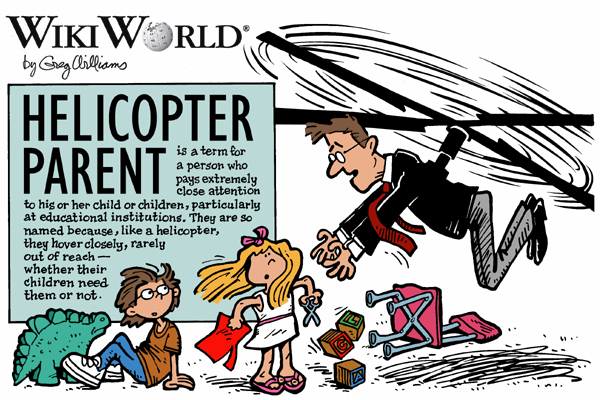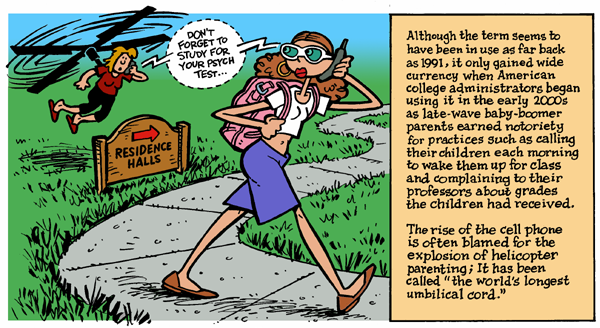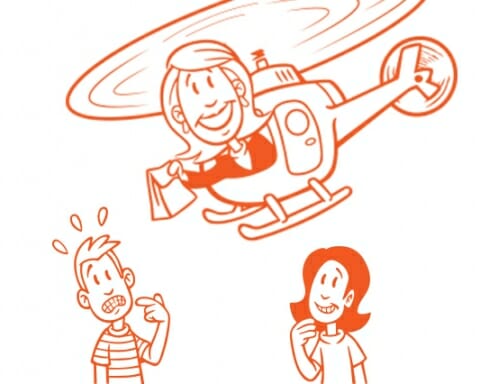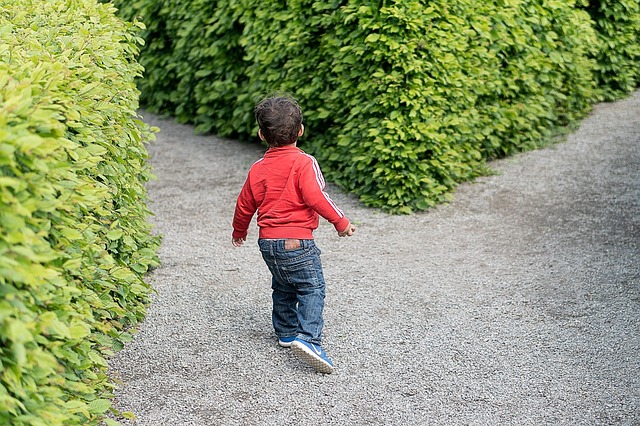Helicopter parenting is a parenting style in which the parents are closely involved with their children’s lives and try to control them too much, especially the aspects and outcomes of their children’s education.

The term helicopter parents was coined by Jim Fay and Foster W. Cline in 1990. As the term implies, the main characteristic of helicopter parents is that they always keep their children at a very close range, constantly hovering over them—literally and figuratively—and trying to make sure that no harm will come to them.
Characteristics of Helicopter Parenting
Helicopter parents are paranoid and never believe that their children are capable of standing on their own. It is very common to see the parents hovering around their children because of their unnecessary fear.
For example, these kinds of caregivers might insist on driving their children to school and back every day because they fear the possibility of abduction. The children may not be allowed to play by themselves because the parents are afraid they might get hurt. The parents even go to the extent of doing their children’s assignments on their behalf.
Helicopter parenting often results in micromanaging because the parents show little trust in their children’s ability to act on their own. Parents who micromanage deny their children opportunities to develop independence and responsibility.
Indeed, studies have shown that helicopter parenting produces individuals who lack confidence because they are used to a micromanaged setup. Thus, helicopter parenting affects all spheres of the children’s lives, including at home and at school.
Helicopter parents also tend to nag people who interact with their children. For example, they may check in with their children’s teachers to an excessive degree.
Another feature of helicopter parenting is the need for instant gratification. Most parents buy gifts for their children for important occasions like birthdays. However, helicopter parents will buy gifts often to satisfy their children’s desires instantly.

Helicopter parents also tend to stand in for their children when they are faced with difficulties and challenges. They often mediate on their behalf. For instance, when both the parents and a child are called in for a meeting with the child’s tutor, a helicopter parent will most likely answer questions meant for the child.
Effects of Helicopter Parenting
The helicopter parenting style has both negative and positive effects. On the positive side, the child-parent relationships tend to be more cohesive, so the parents are able to better understand the child’s abilities (Boen, 2007). Another advantage is the increased sense of security. The children tend to be calmer because they know that their parents are watching over them. Separation anxiety is, therefore, not experienced with this type of parenting.
On the other hand, helicopter parenting can hinder the independence and confidence of the children. The children grow up with less (or no) ambition because they are used to close supervision. In addition, they may not be well-equipped to handle life’s challenges because they are too dependent on others.
References
Boen, Jennifer. “‘Helicopter Parenting’ Hurts More Than Helps: Such Parenting Impedes Child’s Confidence.” The News-Sentinel (Fort Wayne, IN), January 15, 2007. https://www.highbeam.com
Bradley-Geist, Jill, and Julie B. Olson-Buchanan. “Helicopter Parents: An Examination of the Correlates of Over-Parenting of College Students.” Education+ Training 56, no. 4 (2014): 314–328. Retrieved from https://www.emeraldinsight.com












